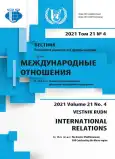China’s Relations with the Mediterranean States: Military and Political Aspects
- Authors: Timakova O.A.1
-
Affiliations:
- Diplomatic Academy of the Ministry of Foreign Affairs of the Russian Federation
- Issue: Vol 21, No 4 (2021): The Greater Mediterranean: Still Constructing the Macro-region
- Pages: 700-711
- Section: THEMATIC DOSSIER
- URL: https://journal-vniispk.ru/2313-0660/article/view/320276
- DOI: https://doi.org/10.22363/2313-0660-2021-21-4-700-711
- ID: 320276
Cite item
Full Text
Abstract
China is one of the most influential non-regional actors in the Mediterranean. As of 2021, it is ranked among the top three trading partners of almost all Mediterranean states. Chinese foreign policy in the Mediterranean reflects the growing importance of geoeconomics and, in particular, economic instruments of foreign policy in China’s foreign policy strategy. The intersection of the routes of the “Maritime Silk Road of the 21st Century” and the “Silk Road Economic Belt” in the Mediterranean basin indicates the region’s high potential for the development of new logistics routes, economic corridors and supply chains. Despite significant impact of the coronavirus restrictions on the global economy and the deepest economic crisis seen in recent years, China has not reduced its global activity. Actually, it is the pandemic that can become an incentive for the development of new formats of cooperation within the “Belt and Road” in the Mediterranean. China’s traditional foreign policy paradigm presupposes emphasis exclusively on economic interaction and “non-involvement” in political issues. De facto China’s economic relations with the countries of the region are increasingly complicated by military and political issues. The article categorizes the main political and security issues that arise between China and partner countries in the Mediterranean region. While the discourse of human rights and sustainable development prevails in relations with Europe, the issues of ensuring security and managing regional instability come to the fore when dealing with the states of North Africa and the Middle East. Given China’s growing economic needs, it is likely that in the medium term there will be a doctrinal formalization of China’s role in the political process in the Mediterranean region.
About the authors
Olga A. Timakova
Diplomatic Academy of the Ministry of Foreign Affairs of the Russian Federation
Author for correspondence.
Email: o.timakova@dipacademy.ru
ORCID iD: 0000-0003-4185-0194
PhD in Political Science, Associate Professor, Department of Political Science and Political Philosophy
Moscow, Russian FederationReferences
- Bogaturov, A. D. (2019). The Chinese angle in the world-system management. Polis. Political Studies, (5), 85-95. (In Russian). https://doi.org/10.17976/ jpps/2019.05.07
- Gavrilova, S. M. (2020). Russia and Italy: Trends in cooperation. Vestnik Diplomaticheskoi Akademii MID Rossii. Rossiya i Mir, (2), 64-77. (In Russian).
- Glantz, M. G. (2020). China’s One Belt One Road (OBOR) Initiative and the Coronavirus pandemic. Post-Soviet Issues, (7), 120-129. (In Russian). https://doi.org/10.24975/2313-8920-2020-7-2-120-129
- Deich, T. L. (2020). Africa’s place in the Chinese initiative “One Belt, One Road”. Mirovaya Ekonomika i Mezhdunarodnye Otnosheniya, 64(2), 118-127. (In Russian). https://doi.org/10.20542/0131-2227-2020-64-2-118-127
- Zhiltsov, S. S. (2019). “One Belt - One Road” initiative: China’s movement to global leadership. Vestnik Diplomaticheskoi Akademii MID Rossii. Rossiya i Mir, (4), 196-202. (In Russian).
- Nosov, M. G. (2018). EU and China: Trade or strategy. Contemporary Europe, (6), 5-17. (In Russian). https://doi.org/10.15211/soveurope620180517
- Semenov, A. V., & Zonn, I. S. (2020). Mediterranean region encyclopedia. Post-Soviet Issues, (7), 460-469. (In Russian). https://doi.org/10.24975/2313-8920-2020-7-4-460-469
- Tsvyk, A. V. (2019). The “Belt and Road” initiative: A view from Europe. Contemporary Europe, (1), 104-112. (In Russian). https://doi.org/10.15211/soveurope1201910411
- Beretta, S., Berkofsky, A., & Zhang, L. (2017). Understanding China today. Cham, Switzerland: Springer International Publishing. https://doi.org/10.1007/978-3-319-29625-8
- Bianchi, R. R. (2019). China and the Islamic world: How the New Silk Road is transforming global politics. Oxford: Oxford University Press. https://doi.org/10.1093/oso/9780190915285.001.0001
- Blanchard, J.-M. F. (2019). Chinese outward foreign direct investment (COFDI): A primer and assessment of the state of COFDI. In K. Zeng (Ed.), Handbook on the international political economy of China (pp. 76-97). Cheltenham: Elgar
- Blanchard, J.-M. F. (2021). China’s Maritime Silk Road Initiative, Africa and the Middle East. Singapore: Palgrave Macmillan. https://doi.org/10.1007/978-981-33-4013-8
- Chaziza, M. (2020). China’s Middle East diplomacy: The Belt and Road strategic partnership. East Sussex: Sussex Academic Press.
- Facing forwards along the Health Silk Road. (2017). The Lancet Global Health, 5(10), e948. https://doi.org/10.1016/S2214-109X(17)30349-2
- Horesh, N. (Ed.). (2016). Toward well-oiled relations? China’s presence in the Middle East following the Arab Spring. London: Palgrave Macmillan. https://doi.org/10.1057/9781137539793
- Khudaykulova, A. V. (2019). China as an emerging actor in conflict management: From non-interference in internal affairs to “constructive” engagement. Vestnik RUDN. International Relations, 19(3), 420-431. https://doi.org/10.22363/2313-0660-2019-19-3-420-431
- Pavlićević, D. (2018). A power shift underway in Europe? China’s relationship with Central and Eastern Europe under the Belt and Road Initiative. In L. Xing (Ed.), Mapping China’s “One Belt One Road” Initiative (pp. 249-278). London: Palgrave Macmillan. https://doi.org/10.1007/978-3-319-92201-0_10
- Shichor, Y. (2018). Vision, revision, and supervision: The politics of China’s OBOR and AIIB and their implications for the Middle East. In A. Ehteshami & N. Horesh (Eds.), China’s presence in the Middle East: The implications of the One Belt, One Road initiative (pp. 38-53). Abingdon: Routledge. https://doi.org/10.4324/9781315185736
- Silin, Y., Kapustina, L., Trevisan, I., & Drevalev, A. (2018). The Silk Road economic belt: Balance of interests. Economic and Political Studies, 6(3), 293-318. https://doi.org/10.1080/20954816.2018.1499072
- Vangeli, A. (2020). China’s Belt and Road in the Balkans in the post-COVID-19 era. European Institute of the Mediterranean. Retrieved from https://www.iemed.org/wp-content/uploads/2021/01/5.1.3.3-Cvijic-2020-02-16T184332Z_1075847178_RC2U1F9VJ9XW_RTRMADP_3_EU-BALKANS-1.jpg
Supplementary files









